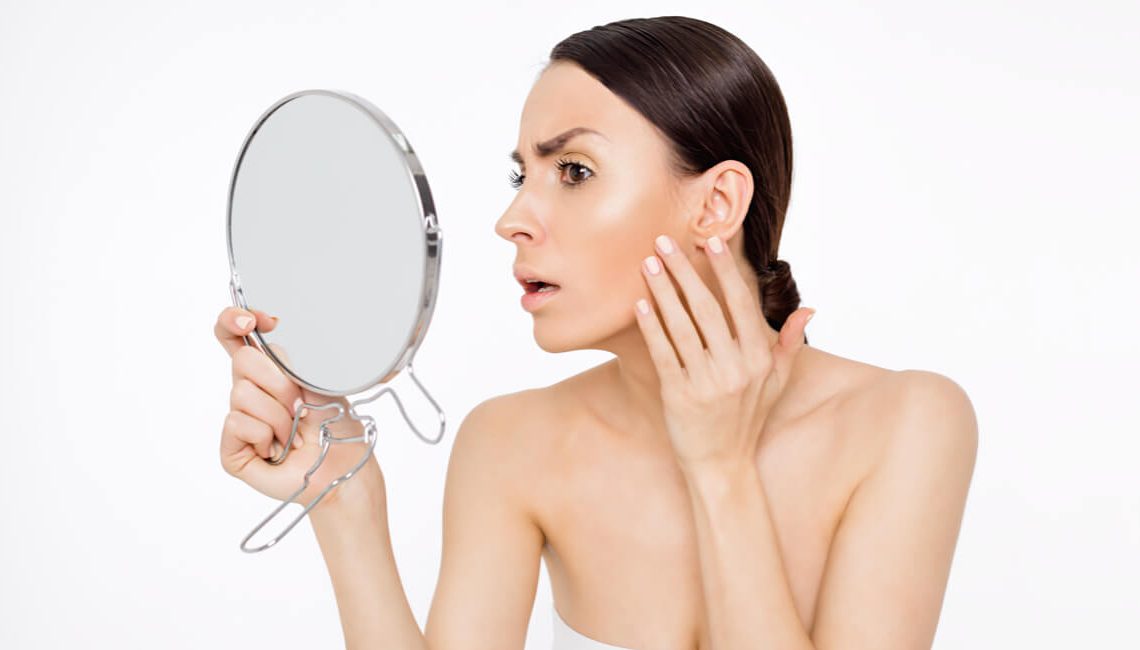
Are you sure your skin would look so much nicer if only you could tighten those pores? Use retinol-based products. Apply sunscreen. And above all, stop staring at yourself in the mirror all day long.
The term porexia was coined by the Australian dermatologist Natasha Cook to indicate an excessive care for the size and appearance of one’s skin’s pores. Many people spend hours in front of a magnifying mirror to point out so-called facial blemishes: comedones, or black heads, greasiness, dilated pores. It’s a form of insecurity, often borderline with perfectionism, which has important psychological significance and should be analyzed and cured.
First off, the number and size of your pores are genetically determined, so little can be done to reduce them; however much can be done to avoid the situation getting worse. Some people have naturally compact skin, while others have skin laxity with visibly dilated pores. Pores are the most superficial part of the skin’s sebaceous glands, where sebum is deposited. Everybody – men and women of all ages – has pores on their faces. It’s their size which makes them more or less visible to the naked eye.
There are two essential conditions which determine dilated pores: 1) excess sebum production, typical of acne-prone skin; 2) cutaneous aging, especially in people who use occlusive products or, more often, high-cover foundation rich in silicone oils. Here is my advice as a dermatologist on how to minimize the problem.
Skincare products.
Only use non-comedogenic skincare and makeup products. The term “non-comedogenic” means the product will not clog up your pores. When pores clog up, they expand, making them more visible. Wash your face twice a day, since cleaning the skin can free the pores from dirt and excess sebum, preventing pore congestion and reducing oiliness. Remember not to use hot water to clean your face, as this might irritate the skin and make matters worse.
Wash your face delicately, avoid scrubs which might irritate the skin. Use a delicate, non-comedogenic detergent. If your skin is prone to acne, your detergent or tonic should contain salicylic acid, which exfoliates and provides deeper cleansing. Some salicylic acid-containing detergents are delicate enough to be used every day, preferably in the evening. Otherwise, you can alternate them with other more delicate detergents, until you yourself find the optimal frequency of use (even once or twice a week could be it).
Retinol: a precious ally.
Cosmetic formulations containing retinol are highly recommended. Retinol has a double function: it reduces seborrhea and light acne, and it makes the skin smoother and more compact, making it suitable both for young and more mature skin. For better results, apply the product before going to bed.
The Sun doesn’t help. Protect yourself from it!
Every day, in the morning, one must apply sunscreen. The more the Sun damages your skin, the less compact it becomes. When skin starts to lose its density, pores become more visible. Applying water-resistant high-range sunscreen with a 30 or higher SPF helps prevent photodamage. And when I say every day, I mean every day, even when it’s raining or cold outside.
Be kind to your skin.
Exfoliating can make pores less visible, but to obtain the desired results you need to exfoliate delicately. So, primum non nocere: be kind to your skin. Rubbing your face, washing it energetically or squashing comedones won’t make your skin cleaner, it will irritate it and make it look worse. Don’t cover your mush with dense foundation, you’ll only make it worse. Don’t use magnifying mirrors, you don’t need them. Keep track of the time you spend in front of the mirror and, if you feel it’s increasing, better seek help from a specialist.
Article of Dr Adele Sparavigna for https://4me.styl


